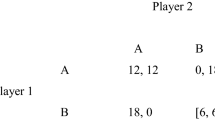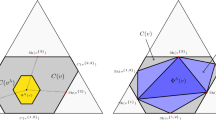Abstract
We define multilinear extensions for multichoice games and relate them to probabilistic values and semivalues. We apply multilinear extensions to show that the Banzhaf value for a compound multichoice game is not the product of the Banzhaf values of the component games, in contrast to the behavior in simple games. Following Owen (Manag Sci 18:64–79, 1972), we integrate the multilinear extension over a simplex to construct a version of the Shapley value for multichoice games. We compare this new Shapley value to other extensions of the Shapley value to multichoice games. We also show how the probabilistic value (resp. semivalue, Banzhaf value, Shapley value) of a multichoice game is equal to the probabilistic value (resp. semivalue, Banzhaf value, Shapley value) of an appropriately defined TU decomposition game. Finally, we explain how semivalues, probabilistic values, the Banzhaf value, and this Shapley value may be viewed as the probability that a player makes a difference to the outcome of a simple multichoice game.
Similar content being viewed by others
References
Alonso-Meijide JM, Carreras F, Fiestras-Janeiro M (2005) The multilinear extension and the symmetric coalition Banzhaf value. Theory Decis 59: 111–126
Alonso-Meijide JM, Casas-Mendez B, Holler MJ, Lorenzo-Freire S (2008) Computing power indices: multilinear extensions and new characterizations. Eur J Oper Res 188: 540–554
Banzhaf JF (1965) Weighted voting doesn’t work: a mathematical analysis. Rutgers Law Rev 19: 317–343
Branzei R, Dimitrov D, Tijs S (2005) Models in cooperative game theory. Springer, Berlin
Calvo E, Salvos JC (2000) A value for cooperative games. Math Soc Sci 40: 341–354
Carreras F, Freixas J (1999) Some theoretical reasons for using (regular) semivalues. In: de Swart H (eds) Logic, game theory and social choice. Tilburg University Press, Tilburg, pp 140–154
Carreras F, Magana A (1994) The multilinear extension and the modified Banzhaf-Colemen index. Math Soc Sci 28: 215–222
Derks J, Peters H (1993) A Shapley value for games with restricted coalitions. Int J Game Theory 21: 351–360
Dubey P., Neyman A, Weber J (1981) Value theory without efficiency. Math Oper Res 6: 122–128
Felsenthal D, Machover M (1997) Ternary voting games. Int J Game Theory 26: 335–351
Felsenthal D, Machover M (1998) The measurement of voting power. Edward Elgar, Cheltenham
Freixas J, Puente M (2002) Reliability importance measures of the components of a system based on semivalues and probabilistic values. Ann Oper Res 109: 331–342
Freixas J, Zwicker W (2003) Weighted voting, abstention, and multiple levels of approval. Soc Choice Welf 21: 399–431
Freixas J (2005a) Banzhaf measures for games with several levels of approval in the input and output. Ann Oper Res 137: 45–66
Freixas J (2005b) The Shapley-Shubik power index for games with several levels of approval in the input and output. Decis Support Syst 39: 185–195
Grabisch M, Lange F (2007) Games on lattices, multichoice games and the Shapley value: a new approach. Math Meth Oper Res 65: 153–167
Hsiao C, Raghavan T (1993) Shapley value for multichoice cooperative games I. Games Econ Behav 5: 240–256
Hwang Y, Liao Y (2008) The solutions for multi-choice games: TU approach. Econ Bull 3(43): 1–7
Moulin H (1995) On additive methods to share joint costs. Jpn Econ Rev 46: 303–332
Owen G (1972) Multilinear extensions of games. Manag Sci 18: 64–79
Owen G (1978) Characterization of the Banzhaf-Coleman index. SIAM J Appl Math 35: 315–327
Owen G (1982) Game theory. Academic Press, New York
Owen G (1992) The multilinear extension and the coalition structure value. Games Econ Behav 4: 582–587
Peters H, Zank H (2005) The egalitarian solution for multichoice games. Ann Oper Res 137: 399–409
Shapley LS (1953) A value for n-person games. In: Kuhn HW, Tucker AW (eds) Contributions to the theory of games, vol. II. Ann Math Stud 28:307–317
Straffin P (1977) Homogeneity, independence, and power indices. Public Choice 30: 107–119
Van den Nouweland A, Potters J, Tijs S, Zarzuelo J (1995) Cores and related solution concepts for multi-choice games. ZOR-Math Meth Oper Res 41: 289–311
Weber RJ (1988) Probabilistic values in games. In: Roth AJ (eds) The Shapley value. Cambridge, New York, pp 101–120
Author information
Authors and Affiliations
Corresponding author
Rights and permissions
About this article
Cite this article
Jones, M.A., Wilson, J.M. Multilinear extensions and values for multichoice games. Math Meth Oper Res 72, 145–169 (2010). https://doi.org/10.1007/s00186-010-0313-6
Received:
Accepted:
Published:
Issue Date:
DOI: https://doi.org/10.1007/s00186-010-0313-6
Keywords
- Multichoice games
- Multilinear extensions
- Shapley value
- Banzhaf value
- Semivalues
- Probabilistic values
- Decomposition games




